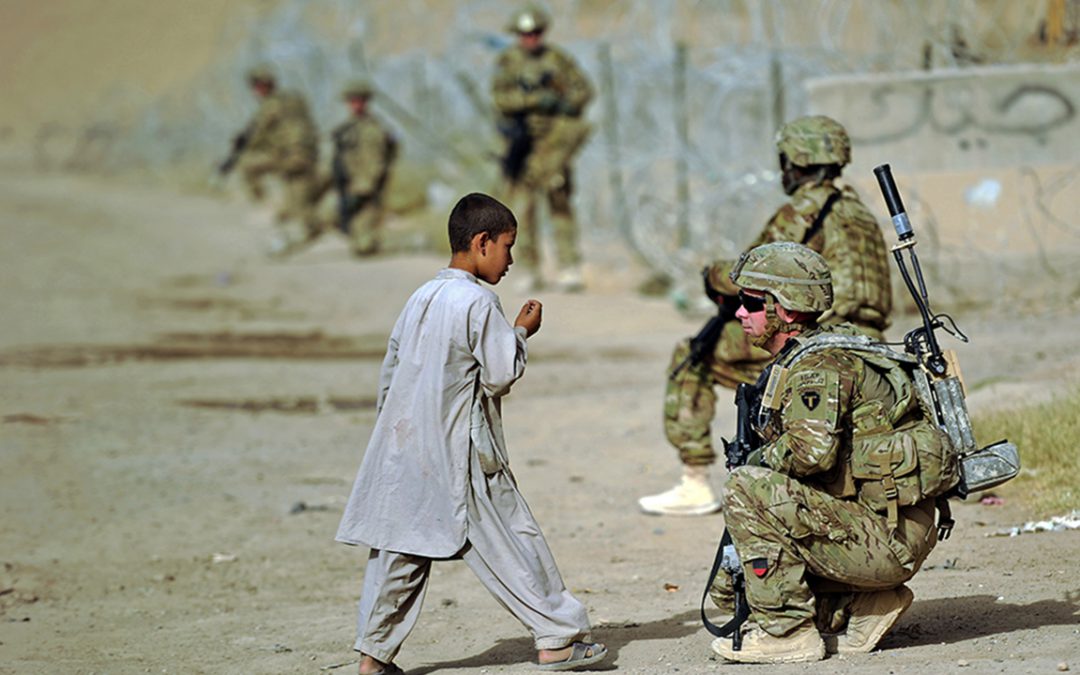WASHINGTON — President Donald Trump and Vice President Mike Pence have told Afghanistan’s leaders that the United States will stand by its commitment to the security of Afghanistan, but what that means in policy terms has not been defined.
Trump tweeted in 2013 that the United States should “get out of Afghanistan. Our troops are being killed by the Afghanis we train and we waste billions there.” Two weeks ago, however, he promised Afghan President Mohammad Ashraf Ghani in a phone call that the United States will honor its commitments in Afghanistan, according to a statement on Afghanistan’s government website.
Pence gave Ghani similar assurances when they met in February at a security conference in Munich.
New questions about Afghan security arose last week when ISIS published pictures on Facebook that appeared to show members of the terrorist organization cutting off the hands of a young thief and destroying poppy fields. ISIS’s intent likely was to show the terrorist group’s power and control in the eastern Afghan province of Nangahar.
Former president Barak Obama said in 2016 that U.S. troops would remain in Afghanistan until at least this year.
Currently, 9,800 U.S. troops and 3.000 NATO troops are operating in the country. In addition, U.S. military officials say that 300 Marines will be sent to embattled southern Helmand province as part of a NATO mission to train and advise local forces.
Lisa Curtis, a senior national security researcher at the conservative Heritage Foundation, said U.S. troops should remain because the “security situation in Afghanistan is precarious and the Taliban have made substantial territorial gains in the last two years.”
“Afghan forces continue to need U.S. and NATO training, air support, intelligence, and battlefield advice to beat back the Taliban threat,” Curtis said. “Removing U.S. troops at this stage would risk the Taliban making additional territorial gains, thus facilitating the revival of al-Qaida in the region and boosting the morale of Islamist extremists across the globe.”
She warned that if the United States withdrew from the country, Afghanistan could revert to being a safe haven for terrorists, many of whom would have American targets in their sights.
While “the war in Afghanistan continues,” said Shahhussain Murtazawi, a spokesman for Ghani, “the Taliban do not control any state in Afghanistan.” He said the extent of Taliban control is nine cities, amounting only to portions of some provinces.
Afghanistan’s ambassador to the United States, Hamdullah Mohib, said President Trump’s concern about fighting in the country was a matter of policy and tactics. Trump “understands the tremendous threats posed by terrorists if they prevail,” Mohib said. “His past stated disagreements with U.S. policy toward Afghanistan have focused on the manner in which the war was being fought so I think we’re on common ground in terms of wanting to change gears and win this fight once and for all.”
Curtis, at the Heritage Foundation, said the Trump administration should review its strategy in Afghanistan to focus on stopping the Taliban from gaining ground and creating an environment that will foster a negotiated political settlement. She also said Ghani needs to rein in corruption.
“Washington should maintain programs that bolster democratic trends, contribute to economic development and regional economic integration, and job creation, particularly in the agriculture sector,” she said. “These programs, however, must be insulated from the pervasive corruption that plagues Afghan society.”
Curtis also agreed with Mohib that Trump should warn Pakistan that its support of terrorists who against the Afghans and Americans must end.
“The Trump administration will also likely try to work with Pakistan,” Curtis said, “but will expect Islamabad to crack down on terrorist sanctuaries that threaten both Afghan stability and Indo-Pakistani ties.”
While some members of Trump’s national security team have significant experience in Afghanistan-notably H.R. MacMaster, the new national security adviser, and Defense Secretary James Mattis – the administration has not detailed its plans for the country. Meanwhile, Gen.John W. Nicholson, the commander of the American-led international military force in Afghanistan warned recently that the United States and its NATO allies are facing a “stalemate “in Afghanistan.
The United States has spent $3.2 trillion on in Iraq and Afghanistan over the last fifteen years, according to a news study from Brown University’s Watson Institute for International and Public Affairs.


